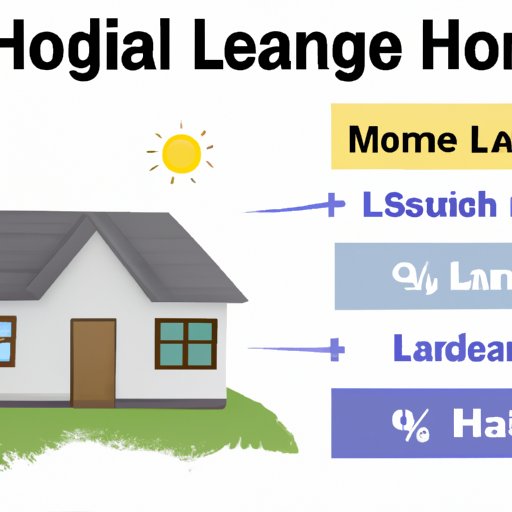Introduction
The decision to purchase a home is one of the biggest investments most people make in their lifetime. It’s important to understand what you can afford before you start looking for homes. Knowing how much you can get approved for a home loan is a crucial part of the home buying process.
This article will provide a comprehensive overview of the process of getting a home loan and how to determine how much you can borrow. We’ll discuss factors to consider when calculating your home loan budget, tips for sticking to your budget, understanding mortgage rates, evaluating your credit score, calculating your debt-to-income ratio, types of home loans, qualifying for a home loan, calculating your maximum loan amount, estimating your monthly payments, and the cost of home buying.
Calculating Your Home Loan Budget: How Much Can You Borrow?
When it comes to determining how much you can borrow, there are several factors to consider. First, you must calculate your total budget. This includes your income, current expenses, and any other debts or liabilities. You should also factor in additional costs such as closing costs, moving expenses, repairs, and renovations.
It’s important to remember that you don’t want to overextend yourself. According to financial expert Dave Ramsey, “Your house payment—including taxes and insurance—shouldn’t be more than 25% of your take-home pay.” That means if you make $3,000 per month, your mortgage payment shouldn’t exceed $750.
Here are some additional tips to help you stay within your budget:
- Set a realistic budget and stick to it.
- Shop around to compare interest rates and loan terms.
- Save up for a down payment.
- Pay off any existing debt.
- Increase your credit score.

The Basics of Getting a Home Loan and How Much You Can Afford
Once you’ve determined your budget, it’s time to start researching home loans. The most important factor to consider is your mortgage rate. A lower interest rate means a lower monthly payment and less money paid over the life of the loan. Shopping around to compare rates from different lenders is key.
Your credit score is also a major factor in determining how much you can borrow. Generally, a higher score will result in a lower interest rate. It’s important to check your credit report regularly and work to improve your score before applying for a loan.
Finally, lenders will look at your debt-to-income ratio. This is the percentage of your monthly income that goes toward paying down debt. Lenders typically like to see a ratio of no more than 43%.
Home Loan Affordability: What Can You Get Approved For?
Now that you know the basics of getting a home loan, it’s time to start looking at what you can actually afford. Different types of home loans have different requirements, so it’s important to do your research. Here are some of the most common options:
- Conventional loans – These are traditional mortgages with fixed or adjustable rates.
- FHA loans – These government-backed loans require a smaller down payment and offer more flexible terms.
- VA loans – These are available to veterans and active duty military personnel.
- Jumbo loans – These are larger loans with higher interest rates.
To qualify for a home loan, lenders will look at your credit score, debt-to-income ratio, and other factors. It’s important to shop around and compare rates and terms from different lenders.
A Guide to Home Loans: How to Determine How Much You Can Borrow
Once you’ve found the right loan, it’s time to figure out how much you can borrow. Most lenders use a formula called the “front-end ratio” to determine how much of your income can go toward housing costs. This formula takes into account your monthly income and your estimated housing expenses (mortgage payment, taxes, and insurance). Generally, lenders prefer a front-end ratio of 28% or less.
You can also calculate your maximum loan amount by subtracting your down payment from the purchase price of the home. This is the amount you can borrow from a lender. It’s important to keep in mind that lenders may approve you for a loan amount that is higher than this number.
In addition to calculating your maximum loan amount, you should also estimate your monthly payments. This will help you determine if the home you are considering is within your budget. To calculate your estimated monthly payments, you can use an online mortgage calculator.
The Cost of Home Buying: How Much Can You Get Approved for a Home Loan?
In addition to your loan amount, you should also consider the cost of home buying. This includes closing costs, which are fees charged by lenders and other third parties. Closing costs typically range from 2-5% of the loan amount. Additionally, you may be responsible for other fees such as appraisal fees, inspection fees, and title fees.
It’s important to factor these additional costs into your budget when determining how much you can afford. You should also set aside money for additional costs such as moving expenses, repairs, and renovations.
Conclusion
Buying a home is a major investment and it’s important to understand what you can afford before you start the process. This article has provided an overview of the basics of getting a home loan and how to determine how much you can borrow. Factors to consider include your budget, mortgage rate, credit score, debt-to-income ratio, and closing costs. By following these steps, you can ensure you get the best possible loan for your situation.
Remember, it’s important to shop around and compare interest rates and loan terms from different lenders. Doing so will help you find the best loan for your needs and budget.
With the right information and preparation, you can confidently start the home buying process and get the home of your dreams.
(Note: Is this article not meeting your expectations? Do you have knowledge or insights to share? Unlock new opportunities and expand your reach by joining our authors team. Click Registration to join us and share your expertise with our readers.)
